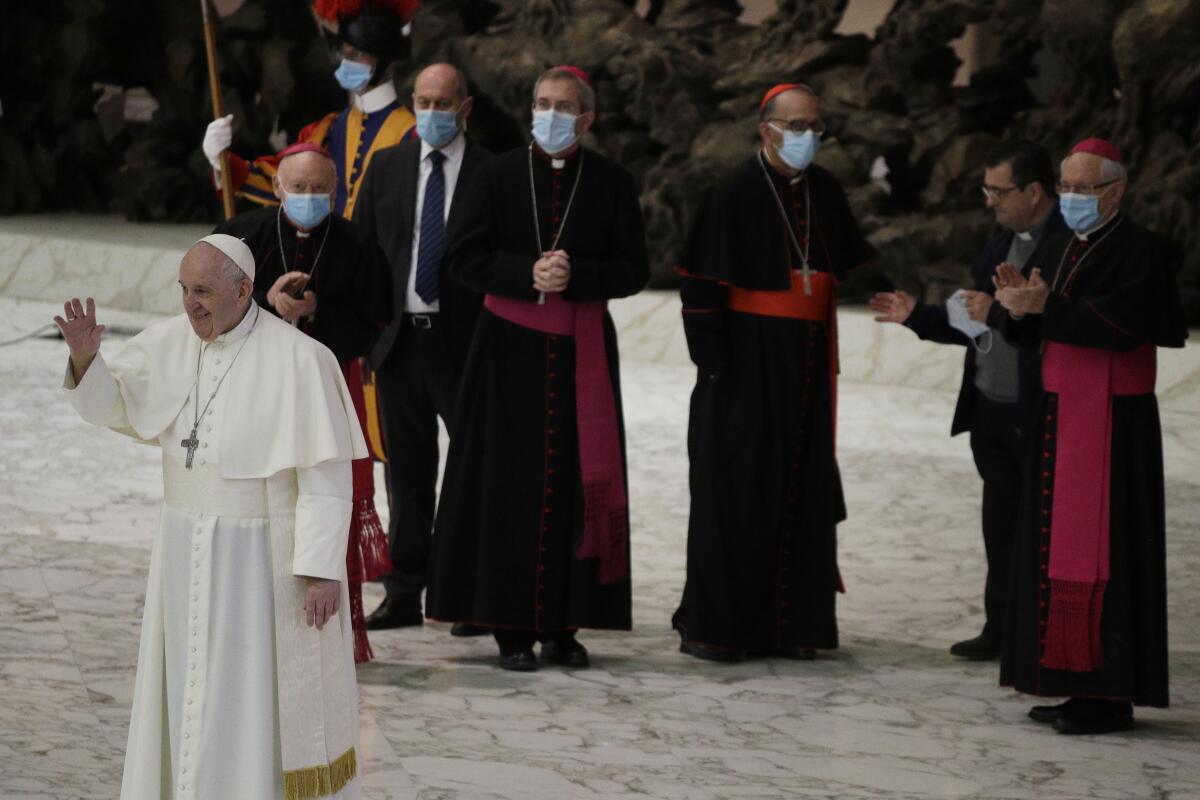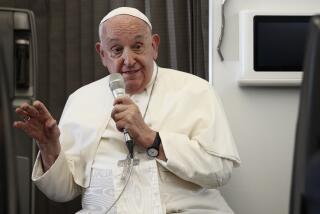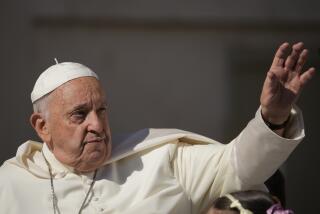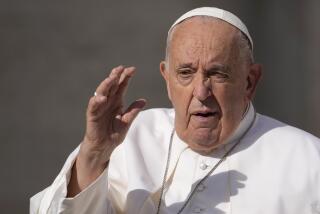Pope endorses same-sex civil unions in new documentary

- Share via
ROME — Pope Francis broke new ground in the Roman Catholic Church acceptance of same-sex civil unions by endorsing some relationships between gay people during an interview for a documentary that premiered Wednesday.
Francis, who has long taken a more socially progressive view than his predecessors, said gay people should not be deprived of family life because of their sexuality.
He drew a line between marriage, which often involves religious consecration, and civil unions, which afford couples full legal rights.
“Homosexual people have the right to be in a family. They are children of God,” Francis, 83, said in the film titled “Francesco” — his papal name in Italian — which made its debut in the Rome Film Festival.
“You can’t kick someone out of a family, nor make their life miserable for this,” he said. “What we have to have is a civil union law; that way they are legally covered.”
His statements were quickly welcomed by many in Roman Catholicism looking to expand the church’s ranks.
“His statement on civil unions is historic and a major step forward in the church’s support of LGBT people,” said Father James Martin, an American Jesuit priest and longtime advocate for the role of gay people in Catholicism.
But observers said the statements were bound to draw ire from the church’s more conservative wing.
In parts of the world where the long-declining Catholic Church hopes to build new membership, gay acceptance could backfire. Homosexuality is still illegal in some countries.
“There will be real protest about this,” said Sandro Magister, a Vatican expert with Italy’s L’Espresso magazine. “The protest will come from people who are convinced you can expect anything from this pope and who believe he is vague and contradictory.”
The Argentine-born Francis, the first Jesuit selected as pope, stunned the world when barely four months into his papacy he signaled a new tolerance. Returning to Rome from a trip to Brazil in July 2013, he was asked to what extent homosexuality was a problem in the church.
“If a person is gay, seeks God and has goodwill, who am I to judge?” Francis said. “They should not be marginalized.”
Since then he has at least twice spoken acceptingly of civil unions — in published interviews in 2014 and 2017 — all the while drawing the distinction between civil unions and marriage for gay people.
While he was Cardinal Jorge Bergoglio, archbishop of Buenos Aires, he advocated for civil unions in 2010 as an alternative to a same-sex marriage law that the government was considering and ultimately approved.
Andrew Chesnut , a chair in Catholic studies at Virginia Commonwealth University, said that while Francis has been on a “rather linear path” toward acceptance of gay unions, the new statements diverge from traditional Catholic Church doctrine.
“He’s never said this so explicitly and forthrightly,” Chesnut said.
Though beloved by church progressives, the poor, the marginalized and many others for whom he advocates, Francis is reviled by many of the archconservatives and traditionalists who accuse him of “diluting” the church’s “purity.” Francis’ predecessor, Pope Benedict XVI, was more of the latter school of thought, who advocated for a doctrinally strict church, even if it meant losing membership.
In the United States, the traditionalists who oppose Francis have made common cause with white Christian evangelicals who support President Trump. The odd coalition was on display last month when U.S. Secretary of State Michael R. Pompeo, a Christian evangelical, wrote critically of Francis in an American publication that has attacked the current papacy as a failure.
Pompeo traveled to Rome on Sept. 30 and was denied an audience with the pope. He spent much of his time with Trump’s ambassador to the Vatican, Callista Gingrich, the ex-wife of conservative former Rep. Newt Gingrich (R-Ga.). Callista Gingrich is Catholic and Newt Gingrich converted to Catholicism out of admiration for Benedict, he has said.
Traditionally, Catholic Church teaching holds that homosexual acts are “intrinsically disordered” but that gay people should be treated with dignity.
A 2003 document from the Vatican’s doctrine office — then led by Cardinal Joseph Ratzinger, the man who would become Pope Benedict — said that respect for gay people “cannot lead in any way to approval of homosexual behavior or to legal recognition of homosexual unions.”
But Francis broke the mold, including in his ministry attention to gays, transgender prostitutes and other marginalized people. In 2018, Francis was reported to have told a gay man that “God made you that way and loves you as you are,” a far cry from church catechism.
“Francis’ statement on civil unions is in keeping with his outreach to LGBT people and with the church’s change in tone,” Martin, the Jesuit priest, said.
“Francis has consistently said that marriage is heterosexual, but has also argued that gays have a right to legal protection including healthcare rights as a couple and inheritance rights,” said Gerald O’Connell, a longtime Vatican watcher who writes in Rome for the U.S. Jesuit magazine America.
“He believes marriage is between a man and a woman, but civil unions are another question,” he said.
He may not have supported gay marriage, but by supporting civil unions, Francis has put distance between himself and his predecessors.
Francis’ support for civil unions will further anger his conservative foes who are already irritated by his push to give communion to remarried divorcees.
“Although Francis said something similar as cardinal, saying this as pope has crossed the line for many practicing Catholics who say it directly contradicts church teaching — in particular the 2003 Vatican instruction which teaches the opposite of what Francis is proposing,” said Edward Pentin, author of “The Next Pope,” a book about leading candidates to succeed Francis.
In large part because of Catholic Church influence, Italy was the last country in Western Europe to legalize civil unions for same-sex couples, in 2016. Catholic bishops in Italy were adamantly opposed. Francis did not intervene.
The director of the documentary, Evgeny Afineevsky, had unusual access to cardinals, the Vatican television archives and the pope himself. Afineevsky was nominated for an Oscar for his 2015 documentary “Winter on Fire: Ukraine’s Fight for Freedom.”
The Vatican press office declined to comment on the film Wednesday, in keeping with its long-held practice of not commenting on statements Francis makes during interviews.
In California, Chris Cappiello, president of the San Fernando Valley chapter of Dignity, a lay Catholic group advocating for the LGBTQ community, said the pope’s latest comments were positive.
“He can change hearts, he can change minds with his words,” Cappiello said. “What hasn’t changed with his words are church doctrine, which still say LGBT people are disordered.”
Many parishes won’t allow married LGBTQ people to hold positions of leadership, such as choir director or minister, Cappiello said.
“I feel like what Francis has done with statements like this one is cracked open a window and let in some fresh air,” Cappiello said. “It always feels good to breathe fresh air, but the question is: Will we get the window all the way open?”
Staff writer Wilkinson, former Rome bureau chief, reported from Washington and special correspondent Kington from Rome. Times staff writer Faith E. Pinho in Los Angeles contributed to this report.
More to Read
Sign up for Essential California
The most important California stories and recommendations in your inbox every morning.
You may occasionally receive promotional content from the Los Angeles Times.











